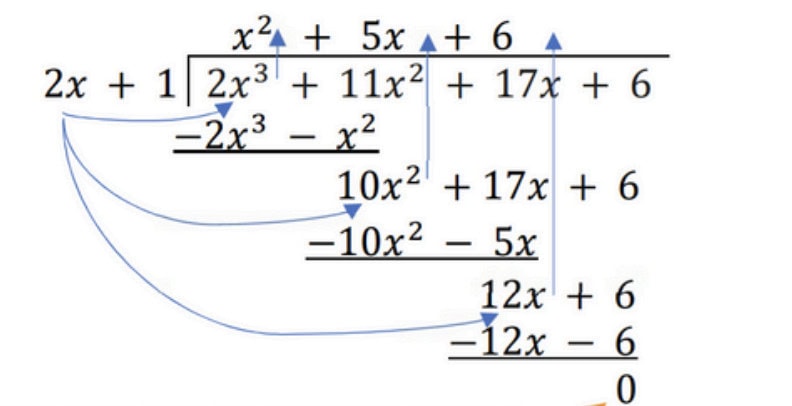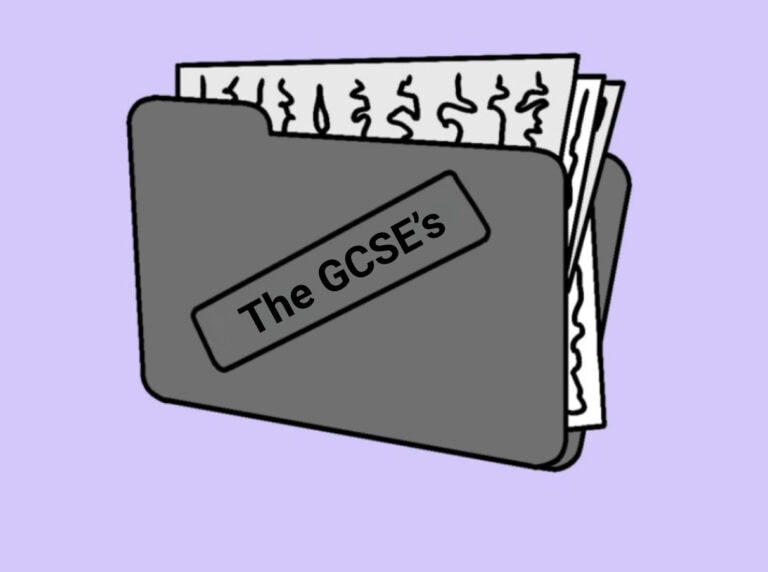Is the GCSE Maths Exam Actually “Hard”?
If you’ve ever sat at the kitchen table watching your teenager wrestle with GCSE Maths homework, you’ll know the scene: pencil tapping, muttered complaints, and eventually “Why is this so hard?”. It’s a fair question. GCSE Maths has a reputation for being one of the toughest exams out there. And honestly? They’re not wrong. But let’s break it down and see why it feels so difficult, and how to make it a little more manageable.
The Big Jump
One of the first shocks is the sheer jump from lower years into GCSE. Suddenly, it’s not just times tables and a bit of algebra. Now we’re talking simultaneous equations, probability, proofs, and quadratics. The names of the topics alone can be overwhelming because they sound so complex.

For example, look at this algebraic long division question and solution. This is a typical question that could be asked on the GCSE Maths exam. It hurts to even look at it, let alone think about solving it.
It’s like going from jogging around the park to suddenly being asked to run a half-marathon. The basics are still there, but the distance and the pace have shot up.
The Pressure to Pass
Here’s the thing: GCSE Maths isn’t just about “scraping by.” The exam boards set it up so that only a certain percentage of students reach the very top grades. Last year, around 3% of students got that elusive grade 9. And, according to this article by The Financial Times: In 2024, around 40% of students actually failed the Maths exam. That is an extremely high percentage.
That can feel demoralising, especially when students see those extra-tricky questions designed for the top end. But the truth is, you don’t need to get everything right. The system is designed so a solid performance across the paper can still secure a good grade.
The Questions That Everyone Hates
Let’s be honest, some GCSE questions are just plain nasty. They mix algebra, fractions, and geometry into one mega-question that looks like it belongs in a university maths paper. Sometimes it’s hard to even tell what topic it’s supposed to be.
Even strong students look at those and think, “Nope.” And that’s okay! Those final, stretch questions are meant to separate the very top candidates. For most students, the straightforward calculations, the basics of numeracy, the percentages even, are where the real wins happen. You don’t need to know how to do the hardest question on the Maths paper to get a good score.
Stress Makes It Feel Harder
Another reason GCSE Maths feels brutal? The stress. Students aren’t just doing one subject, they’re juggling 8 to 10 GCSEs at once. Maths ends up feeling like this never-ending mountain on top of everything else. Most times for students, it’s easier to just give up on maths and focus on every other subject.
And when stress kicks in, confidence takes a hit. Suddenly even easy questions feel impossible. It’s not always about the maths, it’s about the headspace. It sounds cliché, but if you keep reminding yourself that you can do the question, then you’ll approach it from a mindset where you actually can do it. The questions are never new content. It will have been covered in class. So, in theory, students should be able for every question. They just don’t realise it sometimes.
Boys VS Girls in GCSE Maths
In recent years, the performance gap between boys and girls in GCSE Maths has shifted. Back in 2015, girls were slightly ahead, but the trend has now reversed. In 2025, more 16-year-old boys passed Maths than girls, with boys around 1.7% ahead. That may seem small, but that means roughly 12,600 more boys than girls secured a grade 4 or more. This is according to research from 2025.
Why It Feels Tougher Than “Back in Our Day”
Parents often say: “I don’t remember Maths being this hard!” And they’re right, in a way. Since the new 9–1 grading system came in, the exams have become more problem-solving focused. It’s less about memorising formulas and more about showing how you think.
That’s brilliant in theory. It rewards understanding. However, it can leave students feeling blindsided when a familiar topic shows up in a completely unfamiliar format. It can be harder to earn marks based on how you think when most students go into an exam and aren’t thinking clearly at all due to pressure and stress.
In 2015, the BBC wrote an article about the GCSE Maths exam and their research found it to be less complex than other countries’ maths exams, but still quite difficult.
The Challenge of Resits
For students who don’t pass the first time, the resit path is an uphill battle. The numbers show how tough it is: in 2023, only about 16.4% of students managed to pass GCSE Maths on a resit. That means more than four out of five fell short again. The resit system has been criticised for hitting disadvantaged students the hardest, raising questions about whether the current approach really works.
So, How Do You Make It Feel Easier?
1. Focus on the Basics First
The good news? You don’t need to answer every question. Nail the core topics like percentages, fractions, algebra basics and you’ll secure a strong foundation. They don’t expect you to be like Einstein, but they do expect you to know the basics. So prove to them that you do know it! Think of it like football: you don’t need fancy tricks, just consistent passing and tackling.
2. Practice Past Exam Papers
It’s not glamorous, but practice makes perfect. Past papers show the style of the questions, not just the content. They’re key for revision and familiarising you with the style of the exam. Students who’ve seen 10 past papers walk into the exam far calmer than those who haven’t. Plus, if you attempt a past paper and don’t know how to answer a question, then that should be your next topic to study.
3. Break Down the Harder Questions
When a question looks impossible, break it into bite-sized steps. Even if you can’t finish it fully, you’ll often pick up 2–3 marks along the way. And those small wins add up. You’d be surprised at how many marks you can gain before you even write down the answer.
4. Keep Perspective
Remember: nobody is expected to get 100%. GCSE Maths is tough on purpose. However, that doesn’t mean it’s supposed to cause you lots of stress. With steady practice, support, and the right strategies, it’s absolutely conquerable.
Final Thoughts
Yes, GCSE Maths is hard. But “hard” doesn’t mean “unbeatable.” Every year, hundreds of thousands of students cross that finish line, and your teenager can too. And they can probably do it with a decent grade too.
The trick is to focus on steady progress, not perfection. Build the basics, practice regularly, and remind them they don’t have to be a genius, they just have to keep showing up and giving it a go.
At the end of the day, GCSE Maths is less about proving who’s the cleverest, and more about showing resilience, problem-solving, and steady effort. And those are skills that go way beyond the exam hall.


